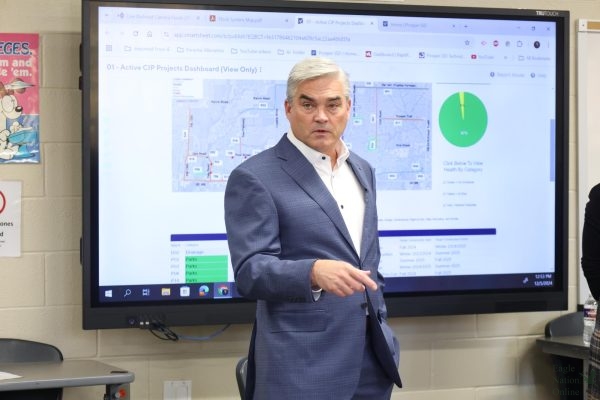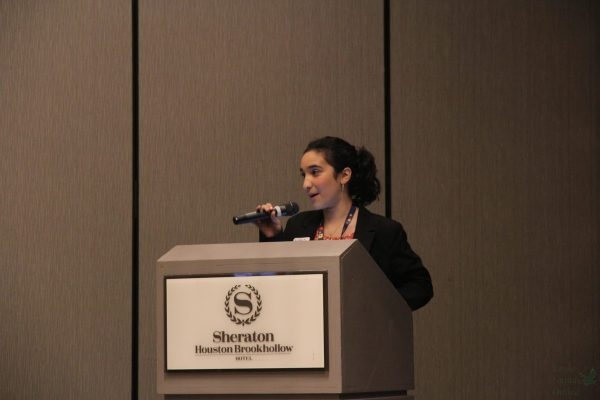Editorial: Space tourism clouds climate change proactivity
In a graphic constructed by sophomore and reporter Kaya Miller, a Blue Origin rocket launches. Blue Origin is a privately owned aerospace company by Amazon founder Jeff Bezos. In Miller’s article, the impact of space tourism on the environment is explained.
As Blue Origin launched its fourth suborbital astro-tourism rocket flight into space this morning, there lies an inconvenient question of ethics for the public’s latest obsession: space tourism.
Successful entrepreneurs Elon Musk’s SpaceX, Jeff Bezos’ Blue Origin and Richard Branson’s Virgin Galactic pioneer the space tourism venture. Musk, Bezos and Branson continue to damage the world around for economic growth.
For a while, space exploration was received as a mission to find an alternative planet in light of a climate change catastrophe. Through the use of deep space probes and exploration, the idea is to find a habitable planet to migrate to once Earth becomes compromised. At the moment, “Plan A,” at home, is to switch from fossil fuels to energy alternatives, such as nuclear and solar energy. But, unfortunately, “Plan A” has not been as effective as hoped.
World economies need to be forward-thinking institutions – instead of prioritizing their economy’s short-term interests, rather than the long-term impact on their citizens.
The Metronome of New York City in Times Square holds the countdown for when climate change becomes irreversible. According to the World Economic Forum, scientists predict that 2027 will be the year this occurs. Now, the world faces taking the correct measures within these five years to stop ignoring climate change and fix society’s habits.
If “Plan A” doesn’t work out because society can’t band together in that 5 years, we’ll fall back on the “Plan B” – move civilization to a different planet. That “Plan B” was a sign of hope, as the bodies that matter the most, like NASA, are putting their time and funding into a solution.
The space exploration race started as a competition between two preeminent Cold War countries – the United States and the USSR on March 12, 1947. Countries competed to launch the first animal in space, send the first human into space and be the first on the moon. Though the competition between nations has never truly ended, this chapter of the space race became less relevant once future space exploration transformed into less geopolitical missions, like searching for traces of water on Mars.
Fast forward to 2022, space exploration reverted to its history of the 1980s and became a capitalistic venture. Space exploration sets up travel plans for families to visit space as their summer vacation. Although the idea of space vacation is enticing, many have wondered about the impact. Space exploration was a possible means to fix the climate change issue. But, in actuality, these new “space exploration ventures,” though popular worsen climate change.
Space tourism can be defined as government-owned – or privately-owned, in the case of SpaceX – spacecraft used for vacation ventures for the general public. This idea has been promoted since the 1990s in the U.S. and Russia, and brought us to Dennis Tito. Tito holds the title of the first space tourist. He paid $20 million for his orbital spaceflight on April 28, 2001. Now, suborbital trips are cheaper than full orbital, averages around $250,000 for a seat, while full orbital averages $50 million.
With such large investments, space exploration is being glamorized as a first-class experience – even the inclusion of a flight attendant in a spacesuit – not to mention the prestige of a social class upgrade.
Aside from SpaceX shifting the original focus of space exploration, the side effects of space exploration are detrimental. Described by Global Citizen, SpaceX’s goal to launch rockets every two weeks will lead to 4,000 tons of carbon dioxide content released every year.
SpaceX tests its technology on the Rio Grande Valley National Wildlife Refuge in Texas. Hitting close to home, wildlife is in direct danger of human impact once again. Furthermore, space exploration releases non-biodegradable debris damaging to infrastructure. Debris has even damaged technology specific for the combat of climate change, such as satellites and the Global Positioning Systems. The effects of space tourism should cancel out its entice of it.
If the motivation stayed consistent with fixing climate change, then space exploration would be done with regard to the environment – except that it’s not. Musk, Bezos and Branson have the financial stability to develop technology that doesn’t hurt the environment. For instance, less carbon footprint technology or biodegradable debris, but they haven’t made that effort.
The problem lies in – when the question of revitalizing space exploration raises – the subject is SpaceX – not true science-based space exploration. Ultimately, science will solve the growing problem of global warming. And, that genuine science cannot be allowed to be filtered through billionaires.
Your donation will support the student journalists of Prosper High School. Your contribution will allow us to purchase equipment and cover our annual website hosting costs.















